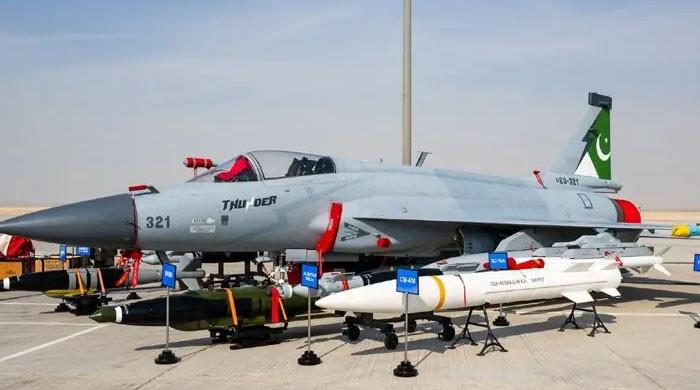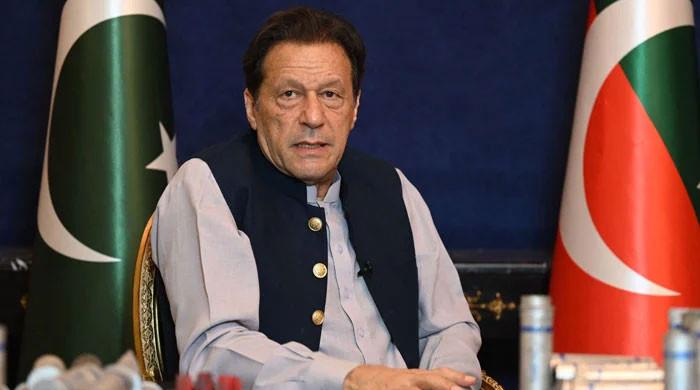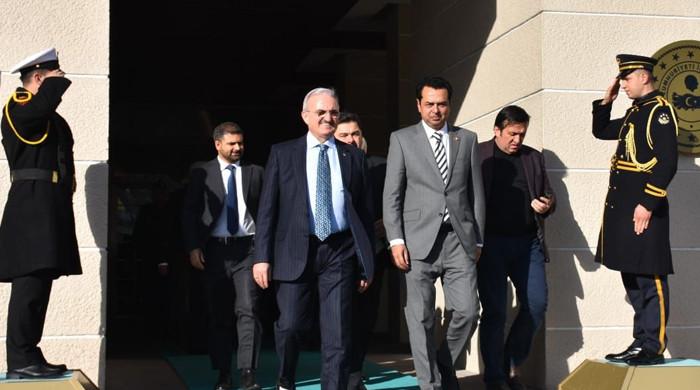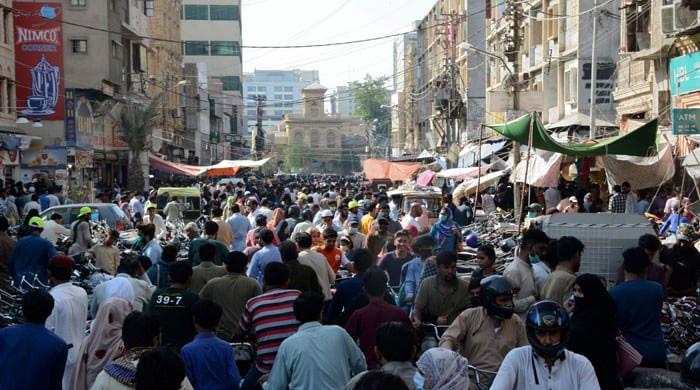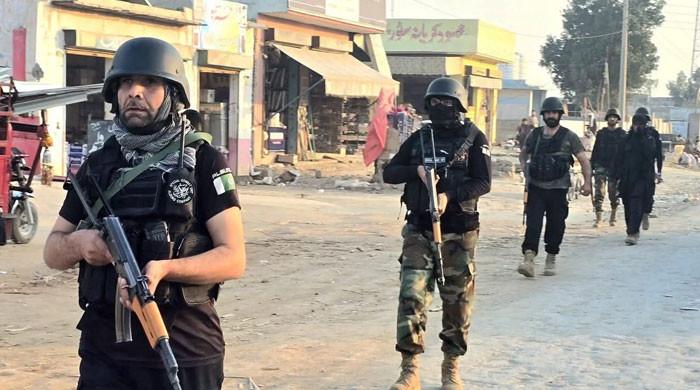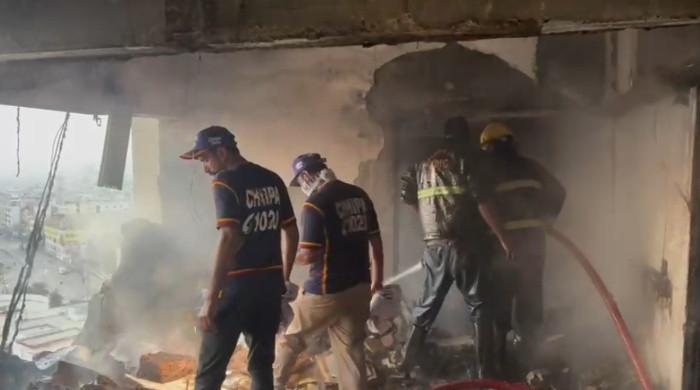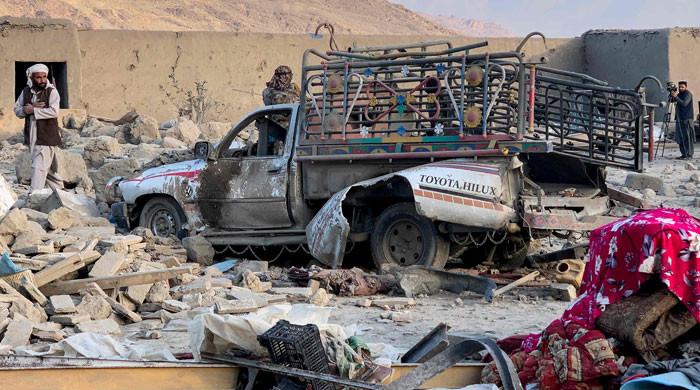'We have our limitations': Pakistan rules out refugee camps to cater to Afghan influx
FM Qureshi says Pakistan cannot host any more Afghan refugees, asks world leaders to recognise Taliban govt
September 15, 2021
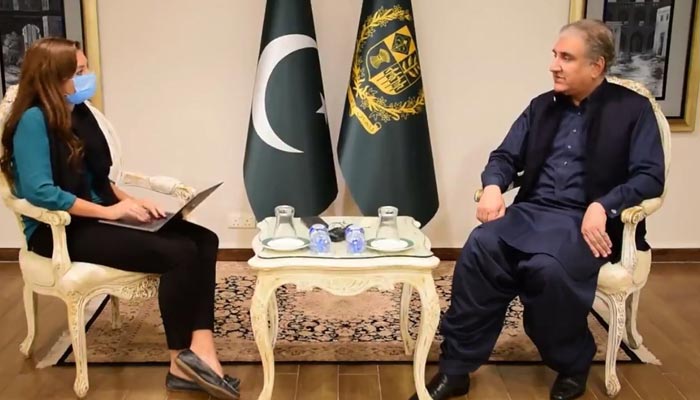
- Qureshi says there has been “no rush” on Pakistan’s borders.
- There is no need for people to flee Afghanistan, Qureshi says.
- Urges global community to recognise Taliban government.
ISLAMABAD: Foreign Minister Shah Mahmood Qureshi has rejected the notion of Pakistan building refugee camps or resettlement processing facilities for the people coming from Afghanistan.
Instead, he said, Pakistan would continue to facilitate the departure of those with valid documents who wished to exit Afghanistan via Pakistan — drawing the line at allowing an influx of refugees.
In an interview with The Independent, a UK publication, Qureshi said Pakistani authorities would consider formal requests “on merit” from the UK for British representation in their embassy in Kabul to help with applications.
Qureshi said there had been “no rush” on Pakistan’s borders, and stressed that there was no need for people to flee Afghanistan as the country was “peaceful and stable”.
“We have our limitations. [Pakistan has] been hosting over three million, almost close to four million refugees for so many decades without any international help or assistance. We do not have the capacity to absorb more, honestly,” he said.
“Our preference is that [Afghans] stay within Afghanistan and they are provided security and safety within Afghanistan,” he said.
He added that any processing facility where Afghan citizens can apply for asylum should be in Afghanistan. “It has to be over there — that is where they belong, that is their country."
The foreign minister said the UK should “accept the new reality” in Afghanistan and deliver immediate aid to the Taliban-run country, warning that isolating the Taliban authorities would lead to economic collapse, “anarchy”, and “chaos”.
He said the UK and its Western allies were not doing enough to engage with the Taliban administration or to avert a burgeoning humanitarian crisis and urged the West to provide supplies with no political conditions attached.
'Isolation will not help'
The foreign minister warned that Pakistan would not be willing to take in any more Afghan refugees as it is already hosting several million from decades of past conflicts.
“My message [to the UK] is that there is a new reality in Afghanistan. Accept the new reality and let us work to achieve our objectives,” Qureshi said.
“Isolation will not help. It will lead to a humanitarian crisis, it will lead to an economic collapse, and it will create space for elements that have not been helpful for you, me, or anyone.
“Anarchy, chaos will facilitate their presence there. Don’t do that. Engagement, we feel, is a better option. If [the Taliban] are saying positive things, nudge them in that direction. Do not push them into a corner.”
One of the first steps, he said, was delivering immediate aid. “There should be no strings attached, there should be no political conditions attached to humanitarian assistance."
Qureshi said Pakistan had received verbal assurances from the Afghan Taliban that they would not allow any group to stage terror attacks on Pakistan from Afghanistan, but he added that Islamabad was waiting to see “if they act on what they’ve said”.
Qureshi maintained that the behaviour of the new Taliban leadership was “quite distinct and different” from that seen in the 1990s, saying that, for example, protests in Kabul had “by and large been tolerated”.
“These are initial signs which are not discouraging. Let’s see if this is the direction that they follow,” he concluded.
Recognition of Taliban govt
A day earlier, Pakistan's Ambassador to US Asad Majeed Khan said Islamabad is monitoring the ability of the new Taliban government in Afghanistan to deliver on the commitments and promises to uphold human rights that they have made to the international community before extending recognition to it.
"Whether the Taliban actually abide by those (commitments) is their call," the Pakistani envoy said in an interview with The Washington Diplomat, an independent monthly newspaper that serves the diplomatic community in the US capital.
"But we have basically laid out our expectations, which is that we want the rights of everyone to be respected," he said, when asked under what conditions Pakistan would recognise the Taliban government.
The envoy's remarks came as the US made it clear to Pakistan that it does not want the country to recognise the Taliban government until it gives women their due rights and allows Afghans who want to leave the country to do so.
Pakistan had, however, already made it clear earlier that although it welcomes the "peaceful" transfer of power in Afghanistan, it will not take a unilateral decision to recognise the Taliban government.
In a call with US Secretary of State Antony Blinken soon after the Taliban assumed power, Foreign Minister Shah Mahmood Qureshi said that Pakistan would remain engaged with Washington and other international partners in promoting efforts for supporting a peaceful and stable Afghanistan.
"Pakistan will not take a unilateral decision of accepting the Taliban government [...] we are in contact with other countries and will make a decision in line with the world powers," he said.
Pakistan's diplomatic efforts for engagement with Afghans
In recent days, Pakistan has engaged in a range of diplomatic efforts to get both regional and Western powers to work with the Afghanistan government in the interest of regional stability as well as humanitarianism.
Foreign Minister Shah Mahmood Qureshi undertook a four-nation tour to Tajikistan, Uzbekistan, Turkmenistan, and Iran to exchange views with them regarding the evolving situation in Afghanistan.
Tajikistan President Emomali Rahmon accepted Pakistan’s proposal for adopting a cohesive approach in achieving the goal to establish peace and prosperity in Afghanistan.
Qureshi, at the conclusion of his tour, said that the neighbouring countries are "fully aware" of the situation in Afghanistan and they are "realistic" about it.
UK foreign secretary Raab and Qureshi also agreed on the importance of engagement with the Afghans.
"We do see the importance of being able to engage and having a direct line of communication," said Raab, in a joint press conference with Qureshi in Islamabad.
Qureshi also held similar conversations with his German and Dutch counterparts.
German Foreign Minister Heiko Maas welcomed the Afghan Taliban's recent statements in which they have promised no retribution and assured to uphold human rights in the country.
Haas said it would be better if a broad-based, inclusive government was formed in Afghanistan.
Dutch Foreign Minister Sigrid Kaag said the European Union will hopefully put together a new strategy on how to deal with the possible risk and continue to build a counter-terrorism strategy to focus on humanitarian needs to ensure that requirements of the people of Afghanistan, women and girls, ethnic minorities, young men and women are met.
In an interview with Sky News earlier this month, Qureshi had said that the international community has to weigh its options now — whether to choose engagement or isolation when it comes to Afghanistan.
Of isolation, he said: "It's a dangerous option. That's an option of abandonment, of Afghan people. Of people. I'm talking of the people.”
“That's the mistake that was committed in the 90s. I would urge the international community not to repeat the same mistake again,” he said, adding that if this happens “it could lead to a civil war, things could become chaotic, there could be anarchy”.
He said that will moreover give space to "the organisations that we all dread", the international terrorist organisations whose footprint we do not want growing.
When asked whether he wants the international community to recognise the Taliban as the legitimate rulers of Afghanistan, the federal minister said that he only feels that it is important to "engage" with the Taliban because the “consequences of disengagement are far worse.”




